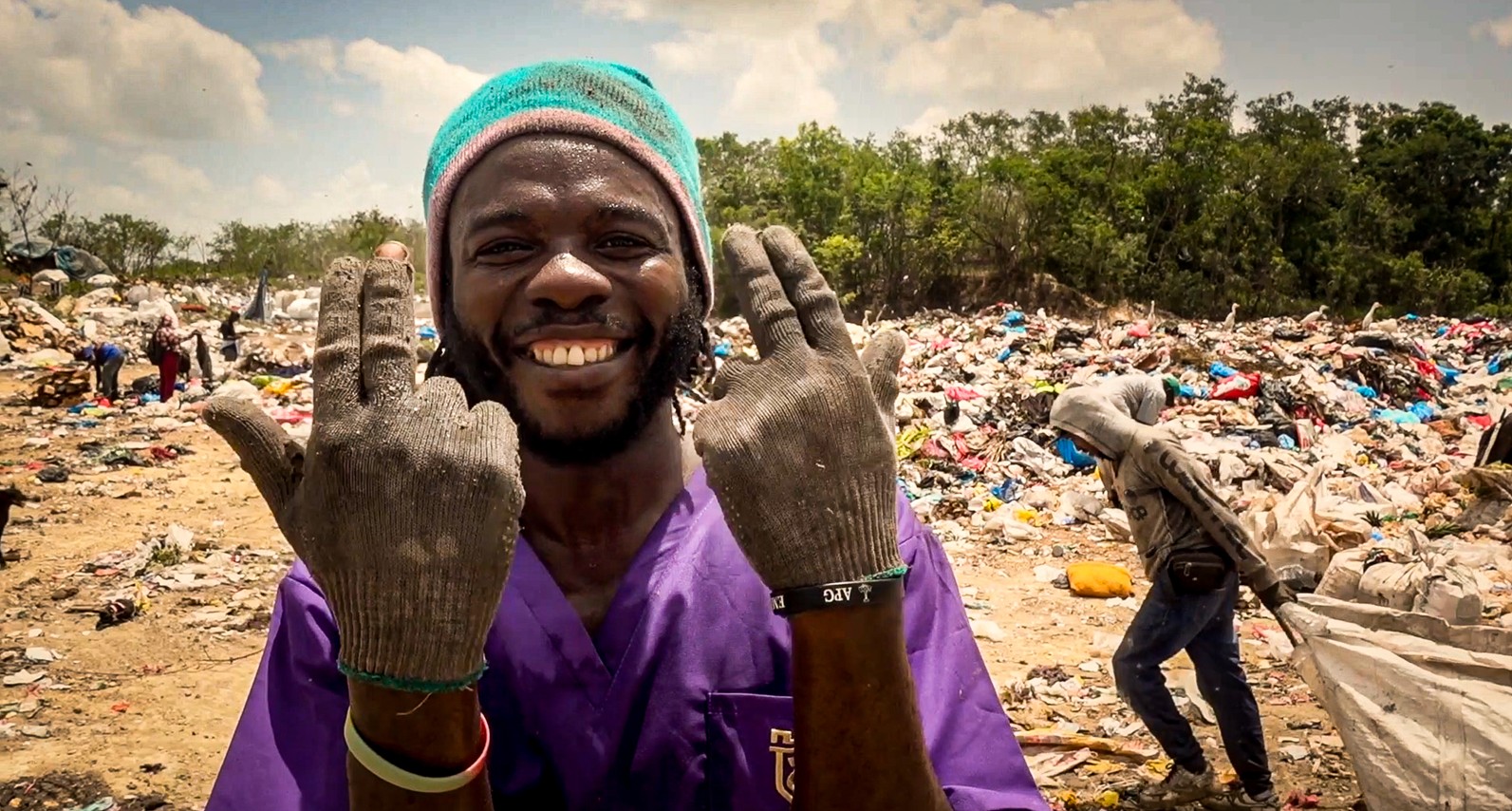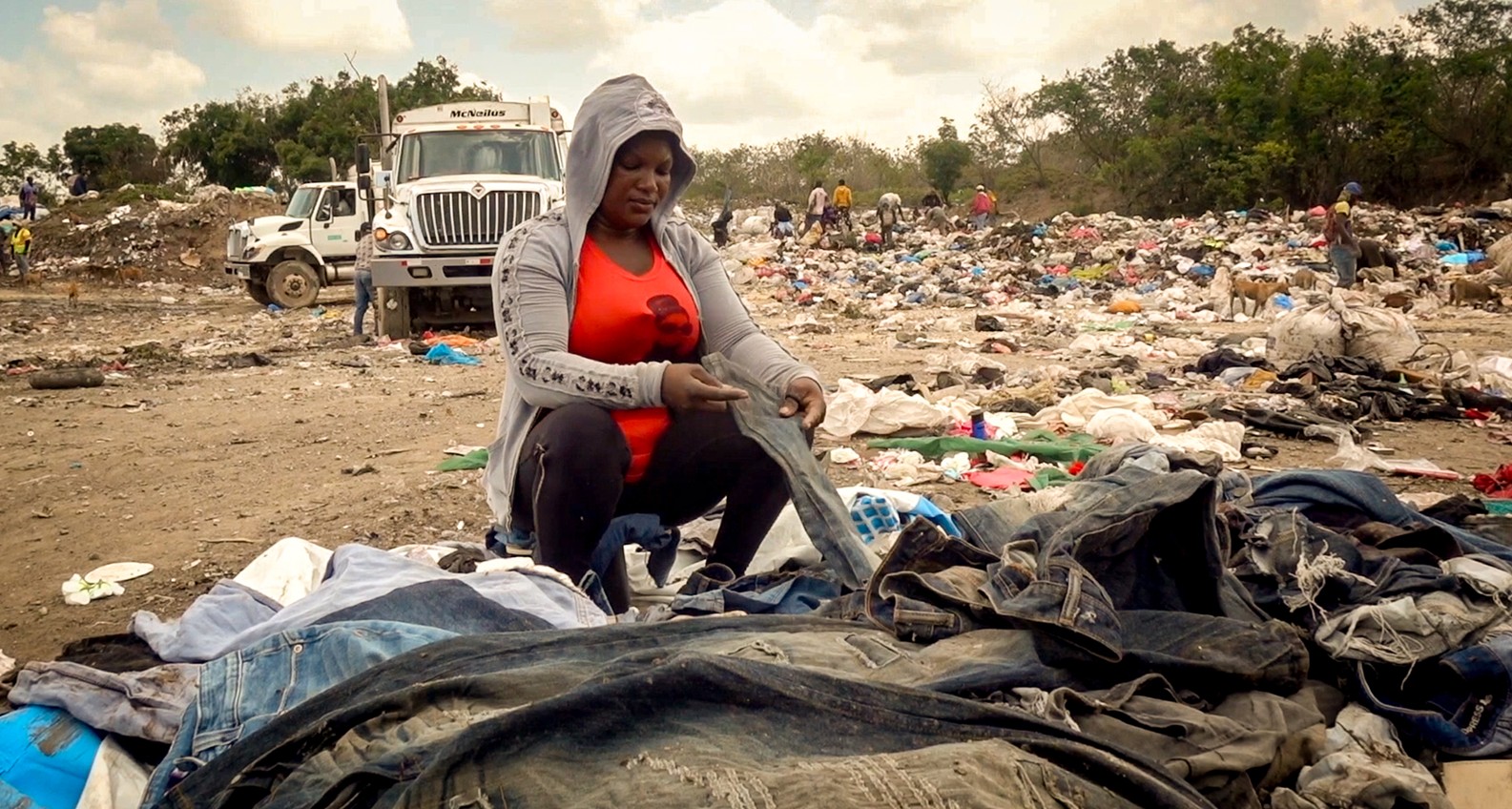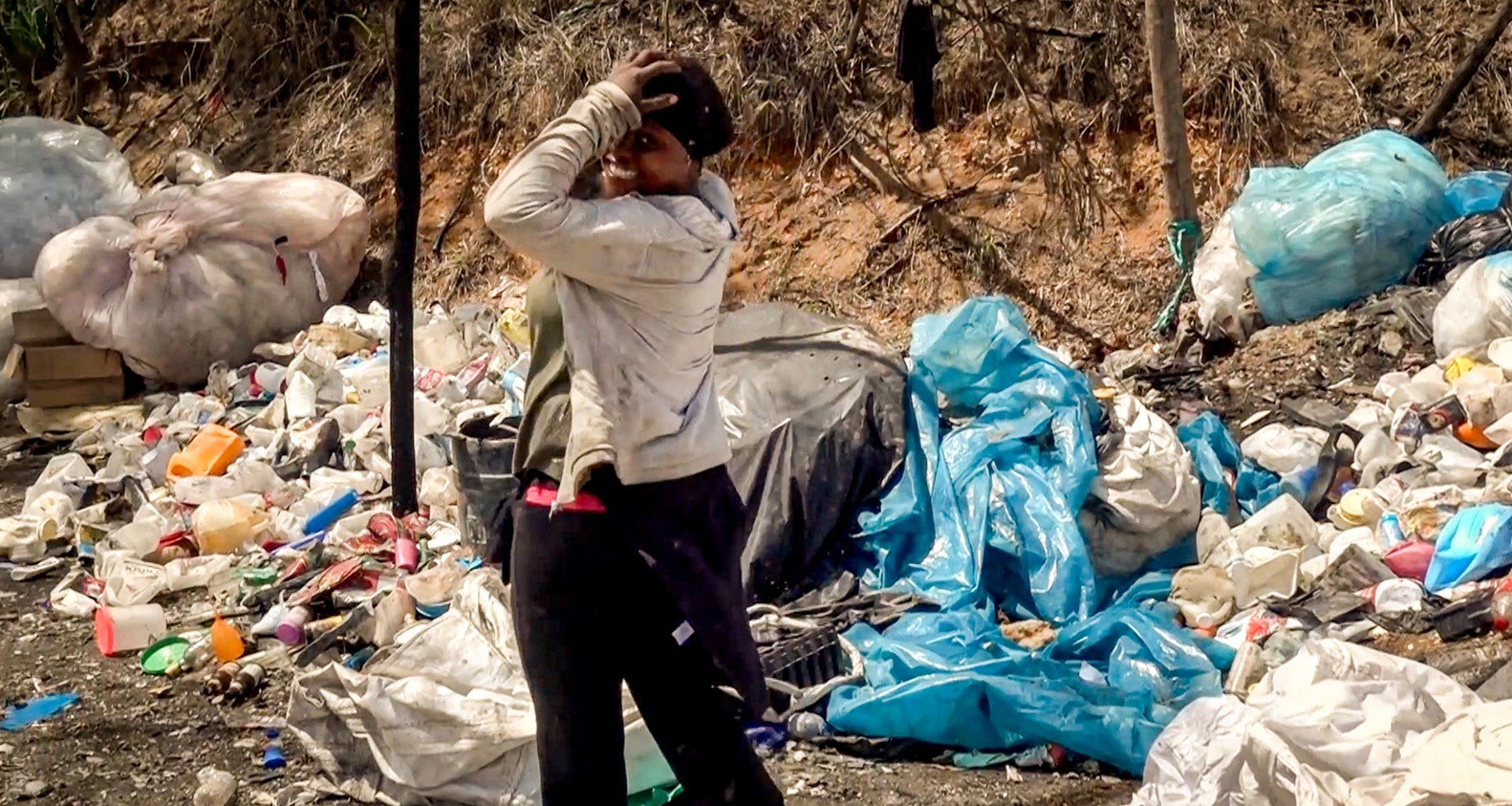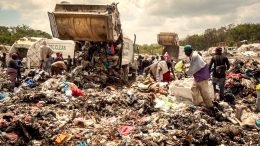San Pedro de Macorís, Dominican Republic — It’s eight in the morning and the landfill wakes up under a veil of smoke. There are no fences, no trees, no shade. Just heaps of smoldering waste blending into the tropical heat. Dozens of people walk across the trash, sacks slung over their shoulders, worn-out rubber boots on their feet. They search for cans, copper, cardboard, plastic, fabrics — even scraps of food.
They search for what no one else wants.
Among them is Kiko, who has worked here since he was a child. Now 30, he knows this place like the back of his hand.
“My mother always went to the landfill,” he says. “I used to beg her to take me with her. I must have been eight the first time I came. For me, it felt like a game, like an amusement park…and time just went by.”
That, Kiko says, is how he became a buzo, the local name for those who scavenge through waste to recover and sell recyclables. He didn’t mean for it to happen. “But I am one, because I live their life.”
Now, like many others, Kiko fears that this world might vanish, a mostly invisible world that’s vital to over 12,000 people across the Dominican Republic.
Many are undocumented Haitians, or children of Haitians born in the bateyes — former sugar cane settlements that now survive as impoverished communities, remnants of a declining economy now replaced by the service sector, with tourism as its core.
A Necessary Law, an Unexpected Threat
Tourism is booming in the Dominican Republic: over 11 million visitors in 2024 — nearly matching the country’s population of 11.4 million. That’s a 35% increase from 2023, almost double the pre-pandemic figure of 6.4 million in 2019, and more than twice the 5 million recorded in 2014 — a dramatic surge that fuels consumption and, in turn, waste.
But where does all that garbage end up?
Each year, the country produces more than 7 million tons of solid waste. Only 7% of it is recycled, according to a 2023 report by the Economic and Commercial Office of the Spanish Embassy in Santo Domingo. The rest mostly ends up in open-air landfills — 358 across the country — many of which lack even basic environmental or sanitary controls. It’s no coincidence that the country ranks 165th for waste management in Yale’s 2024 Environmental Performance Index.
To address this crisis, the Congress of the Dominican Republic passed the General Law on Comprehensive Waste Management and Co-processing (Law 225-20) in 2020 with a goal of completely overhauling the national waste system. One of its most ambitious measures: the progressive closure of at least 30 open-air landfills, as part of a shift toward a cleaner, more formalized economy.
At first glance, this seems like a positive step for the Dominican Republic’s environment — and it is. But there’s a darker side: the law fails to include effective mechanisms for integrating informal recyclers — the buzos — who live and work in these areas. Nor does it acknowledge the social and economic role that these informal networks play for thousands of families.
Without clear inclusion policies, closing landfills could leave thousands of people outside the system — without income, without support, and with no real alternatives.
“It’s a necessary reform and undoubtedly a significant achievement,” says Felipe Rosario Nolasco, coordinator of the National Movement of Recyclers of the Dominican Republic, an organization founded to advocate for the rights of buzos. “However, there’s one aspect that deeply concerns us. The law does not clearly define what role recyclers will play in this process. There’s no regulation that mandates our inclusion, nor have any working groups been set up to discuss the matter. We risk being excluded from the very system we have helped sustain for years. Instead of recognizing and strengthening our work, it is being pushed aside.”
According to Nolasco, private companies are already taking advantage of the situation, “as in Santiago de los Caballeros, where a single company has taken control of the entire recycling sector.” Corporate jobs go exclusively to citizens, which excludes most buzos, who overwhelmingly lack official immigration status or papers.
Nolasco says he worries about the social cost of this legislation. “Without addressing the human dimension, this won’t be a just transition — it will be the systematic exclusion of the most vulnerable.”
Life on the Margins, Lived with Dignity
Life in the landfill is harsh. Kiko knows it well.
“Working here is dangerous,” he says. “You reach into a sack and you might get pricked by a syringe or cut by glass. You feel nauseous, you vomit. Sometimes you can’t take the flies. I’ve seen terrible things… We’ve found newborn babies, dead, thrown into the trash. Even murdered people — burned, abandoned.”

And still, Kiko would rather be here. Because despite everything, in this place that others avoid, he has found a way to live — and to exist — that he wouldn’t trade for anything.
“I like working in the landfill. I won’t lie — I grew up here, and I feel like I belong. Some might find it disgusting, but I was born and raised here. Nothing bothers me,” Kiko says, his eyes bright with a kind of quiet pride. Then he adds: “I’d much rather work here than cut sugar cane. In a day here, you make what would take a week over there. And you’re alone. No one bosses you around. No one tells you what to do or how long to work. You’re your own boss.”
More than just a dump, the landfill is, for many, a space of freedom. Precarious, yes, but real. Because this place, full of danger and debris, also offers something the outside world never gave them: freedom, respect, a sense of belonging.
Altagracia, a 48-year-old woman who used to work in the cane fields and now sells second-hand clothes in the bateyes, says it plainly: “There’s respect here. In the landfill, we’re all equal. If you respect yourself, others respect you too. I like that. I feel like I’m with family here.”

Nairobi, 24, found something unexpected in the landfill: love. She arrived after leaving a job selling food on the plantations — work that didn’t pay enough to survive.
“People would buy on credit and then couldn’t pay me back,” she explains. Now she’s been recycling plastic and cardboard for three years.
Her partner, Francisco, unable to work after surviving an assault, stays home with their child while she earns their daily income under the sun. He shares their story with a quiet smile, as if he still can’t quite believe it: “We argued a lot at first, but you know, talking and talking… in the end we fell in love. It happens. And now look at us — we’ve lived together for a year and have a child.”
In the landfill, homes, families, and futures are built — even among waste and neglect. Here, thousands of people — invisible to the system — find new ways to live, to resist, to reinvent themselves.
But this fragile web of autonomy and dignity rests on shaky foundations: lack of documents, structural discrimination, and the constant threat of being expelled.
The Price of Informality
“There are so many people like me without papers,” Kiko says. “I couldn’t go to school because of it. And without documents, you can’t do anything.”
His story is far from unique.
According to the Dominican Republic’s National Movement of Recyclers, between 60% and 70% of landfill workers lack legal migration status. As a result, they cannot be formally recognized as “service providers” under the new waste management system set out by Law 225-20. Under this law, service providers would be authorized actors responsible for tasks such as waste collection, transport, transfer, and sale — key operations in what is meant to become a formalized recycling chain. The law envisions a gradual integration of informal recyclers into this system, but without legal status, most remain excluded. They’re informal workers who are invisible to the system and are denied access to rights and services.
The situation is compounded by a disturbing trend: in the past six months, more than 180,000 Haitians have been deported by Dominican authorities, amid rising xenophobia and political tension between the two countries. By comparison, the Trump administration deported fewer than 66,000 people during its first 100 days.
“Law 225-20 aims to modernize the nation and build a cleaner recycling economy. But unless structural barriers — undocumented status, systemic discrimination, migration policy — are addressed, the closure of landfills won’t be a step forward, but a social catastrophe for thousands,” warns Nolasco, offering a stark reminder of the human cost behind policy decisions.
Nairobi earns the equivalent of $4.50 a day — but it’s not a fixed wage. Like everyone else, she works by the piece: if she gets sick or doesn’t collect enough recyclables, she earns nothing. And what she does manage to make supports not just herself and her young son, but also Francisco, who stays home to care for the child. “I don’t want my son to work here,” she says. “I want him to go to school and decide for himself what to do with his life. But now… without papers, there’s no other option.”

Kiko writes songs, sings, and dreams of performing on stage. “Maybe one day I’ll become famous. Who knows if I’ll still be here. Today I am. Tomorrow… maybe not. But anything could happen.”
No one should need to rely on a landfill or put their health at risk to process a nation’s waste, but Kiko and the thousands of other buzos have adapted to society’s failures. Shutting down the landfills without creating real alternatives isn’t progress. It’s throwing away the lives of those who live among the waste — yet fight, every day, for their dignity.
Watch a trailer for “Chibol: Lives of Waste,” the author’s documentary about the buzos of the Dominican Republic:

Previously in The Revelator:
In Austria the Government Pays to Repair Your Stuff

